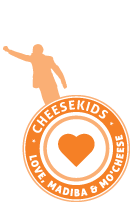Cheesekids for Humanity News
Pupils have a blast with Mathletes

A pair of American university graduates is giving grade six pupils at two North West province schools a shot at success by incorporating a fun contest, run over two school terms, through which they can improve their mathematics skills.
Volunteers for the Peace Corps in South Africa, Chris Ames and Genna Cummins, hold BSc degrees in maths and applied sciences respectively. Ames graduated from the University of Illinois at Chicago, while Cummins studied at the University of the Cumberlands in Kentucky.
After their arrival in South Africa in 2011, the two conceptualised the competition, called Mathletes for two schools where they currently volunteer, in the Thutlwane and Madibogo villages. Mathletes is based on the popular US programme aimed at getting pupils competitive in maths.
Removing the anxiety from learning
Their vision for participants, says Ames, is to remove the anxiety with which pupils often approach maths. Although there is no prize for the ultimate winners, the volunteers are encouraged by the fact that the pupils’ skills will be improved.
“One of the many reasons that maths skills are so poor in rural South Africa is the amount of intimidation and anxiety the subject induces in pupils,” he says.
The idea of Mathletes is already well known in the US, he adds, so they thought an adaptation for South African pupils would be helpful and fun.
“For many students, competition is an effective way to encourage them to learn.”
Six schools participated in the contest at the beginning of the second term around April 2012, with each sending six pupils to take part in three rounds of the contest. The teams meet at a central point after school every Wednesday, which is generally dedicated to sports activities at most public schools.
Each team has to win as many points for their school as possible to avoid elimination and make it to the next round. The team with the highest score at the end of the day is the winner for that week.
In the first round, all of the players attempt to answer a multiplication question. The first student to answer the question correctly gains a point. In round two, the students answer questions in five different categories of varying degrees of difficulty and point values. In the third round, each team has five minutes to solve one final problem.
The games are all based on the approved national curriculum for schools, Ames explains. “For this reason we had to focus on one grade when we designed the questions.”
“We felt it would be best to target the highest primary school level to minimise language barriers.”
The competition runs from around 1pm to 3pm, with the host school in charge of providing and setting up a projector. At least two teachers facilitate for the duration of the game, which is partly presented on Powerpoint.
The only requirement for schools wishing to participate is that they be situated in the Madibogo and Setlagole areas. Those from outside these areas can contact Thutlwane Primary School to make arrangements.
To keep the ball rolling, Ames and Cummins have designed a template that teachers will be able to use for the 2014 round, when the two volunteers will be back in the US. The pair will still be in South Africa for the start of next year’s contest in April.
Using the template, the schools will be able to create their own games using a list of topics they should expect to be addressed in each game. Ames and Cummins also assisted teachers in the writing of maths problems to keep the challenge sustainable.
Potential vs. opportunities
With time, the volunteers hope to create templates of the game for other grades as well. They also intend to expand the initiative to other schools within a reasonable distance, for logistical reasons.
“It has always been our goal to eventually have Mathletes run by the schools themselves without our aid,” says Ames. “I see potential in the pupils in South Africa, but opportunities for them seem scarce.”
“By the time we leave we hope to have provided schools and communities with sustainable development in areas where our skills and their needs meet.”
About Peace Corps
The Peace Corps programme was established in South Africa in 1997, and more than 1 050 volunteers from the US have served all around the country to date. There are currently 183 volunteers placed in different areas where their expertise in health and education services is used daily to benefit disadvantaged communities.
As part of their programme, volunteers are encouraged to learn as many of South Africa’s indigenous languages as possible to help make their work easier. The education focus is usually on primary schools in the country’s rural areas, while other volunteers work in health services at community health and HIV/Aids centres as well as with home-based care organisations.
As education Peace Corps volunteers, Ames and Cummins were assigned to schools, and were tasked to help improve the proficiency of pupils in certain subjects. They will be based at their schools until September 2013.
- No events listed, please check back later or contact us.








